(完整word版)2014年秋期末九年级英语试卷
- 格式:doc
- 大小:486.00 KB
- 文档页数:8
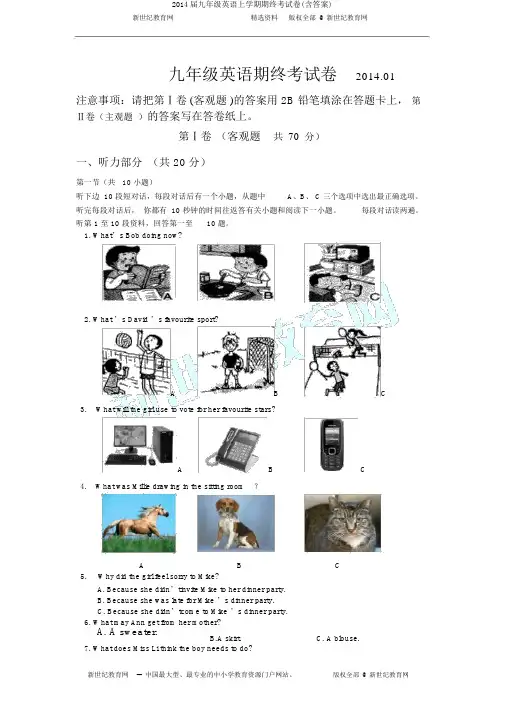
新世纪教育网精选资料版权全部@新世纪教育网九年级英语期终考试卷2014.01注意事项:请把第Ⅰ卷 (客观题 )的答案用2B铅笔填涂在答题卡上,第Ⅱ卷(主观题)的答案写在答卷纸上。
第Ⅰ卷(客观题共70分)一、听力部分(共 20 分)第一节(共10 小题)听下边 10 段短对话,每段对话后有一个小题,从题中A、B、 C 三个选项中选出最正确选项。
听完每段对话后,你都有 10 秒钟的时间往返答有关小题和阅读下一小题。
每段对话读两遍。
听第 1 至 10 段资料,回答第一至10 题。
1. What’s Bob doing now?2. What ’s David ’s favourite sport?A B C3.What will the girl use to vote for her favourite stars?A B C4. What was Millie drawing in the sitting room?A B C5.Why did the girl feel sorry to Mike?A.Because she didn’tinvite Mike to her dinner party.B.Because she was late for Mike ’s dinner party.C.Because she didn’tcome to Mike ’s dinner party.6.What may Ann get from her mother?A. A sweater.B.A skirt.C. A blouse.A. Study hard.B. Learn some useful study skills.C. Have a talk to his teachers.8. How does the boy feel about the next Maths exam?A. Worried.B. NervousC. Confident.9. When does the boy go to bed every day?A.At10:00 p.m..B. At 10:30 p.m..C. At 11:10 p.m..10. Who does the boy think will get the Best Actress Award this year?A. Amy.B. Sandy.C. Millie.第二节听对话和短文回答以下问题(计 10 分,每题 1 分)你将听到一段对话和两篇短文,各听两遍。
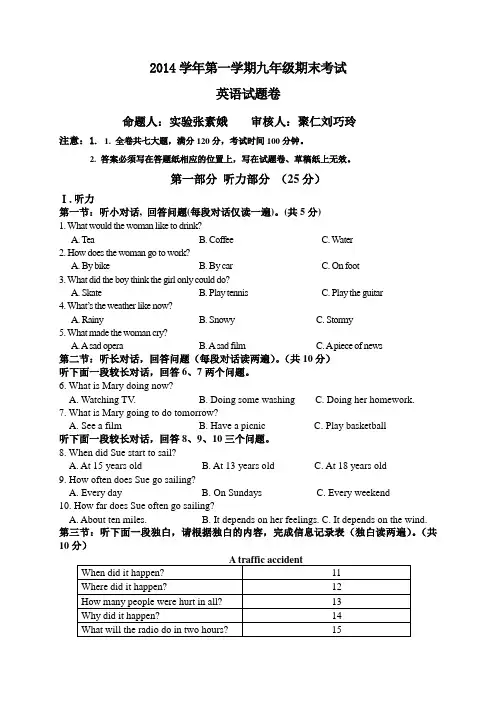
2014学年第一学期九年级期末考试英语试题卷命题人:实验张素娥审核人:聚仁刘巧玲注意:1. 1. 全卷共七大题,满分120分,考试时间100分钟。
2. 答案必须写在答题纸相应的位置上,写在试题卷、草稿纸上无效。
第一部分听力部分(25分)Ⅰ.听力第一节:听小对话, 回答问题(每段对话仅读一遍)。
(共5分)1. What would the woman like to drink?A. T eaB. CoffeeC. W ater2. How does the woman go to work?A. By bikeB. By carC. On foot3. What did the boy think the girl only could do?A. SkateB. Play tennisC. Play the guitar4. What’s the weather like now?A. RainyB. SnowyC. Stormy5. What made the woman cry?A. A sad operaB. A sad filmC. A piece of news第二节:听长对话,回答问题(每段对话读两遍)。
(共10分)听下面一段较长对话,回答6、7两个问题。
6. What is Mary doing now?A. Watching TV.B. Doing some washingC. Doing her homework.7. What is Mary going to do tomorrow?A. See a filmB. Have a picnicC. Play basketball听下面一段较长对话,回答8、9、10三个问题。
8. When did Sue start to sail?A. At 15 years oldB. At 13 years oldC. At 18 years old9. How often does Sue go sailing?A. Every dayB. On SundaysC. Every weekend10. How far does Sue often go sailing?A. About ten miles.B. It depends on her feelings.C. It depends on the wind. 第三节:听下面一段独白,请根据独白的内容,完成信息记录表(独白读两遍)。

2013年秋期末考试题一、听力理解(15小题,1-10小题各1分,11-15小题各2分,共20分)第一节: 听下面5段对话。
每段对话后有一个小题,从题中所给的A、B、C三个选项中选出最佳答案,并将其标号填入题前括号内。
每段对话读两遍。
()1.Where would the girl like to visit?A. B.C.() 2.What kind of food did the man eat at Paul’s house last night?B. C.A.()3.W hich woman is Dan’s mother ?A. B. C.()4.What will the man do this summer vacation ?()5.What are they talking about?第二节: 听下面几段对话。
每段对话后有几个小题,从题中所给的A、B、C三个选项中选出最佳答案,并将其标号填入题前括号内。
每段对话读两遍。
听下面一段对话,回答第6至第7两个小题。
()9. What’s wrong with the boy?A. He is tired.B. He is thirsty.C. He is hungry.()10. What does the boy ask his mother to do?A. To call his father.B. To cook dinner.C. To help his father.听下面一段对话,回答第8至第10三个小题。
()8. Why can’t the old man find his daughter’s home?A. Because Shanghai has changed a lot.B. Because he has never been to Shanghai.C. Because his daughter moved to a new house.()9. How did the old man come to Shanghai?A. By bus.B. By plane.C. By train.()10. Where does the old man’s daughter work?A. In a big park.B. In a hospital.C. In the train station.第三节: 听下面一篇短文。
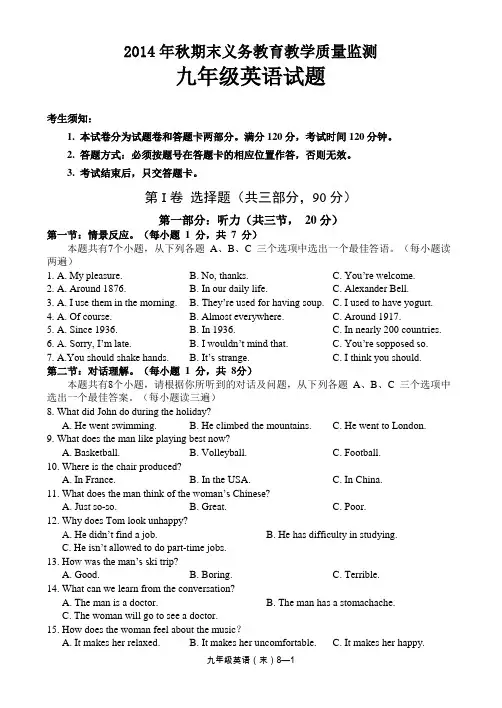
2014年秋期末义务教育教学质量监测九年级英语试题考生须知:1. 本试卷分为试题卷和答题卡两部分。
满分120分,考试时间120分钟。
2. 答题方式:必须按题号在答题卡的相应位置作答,否则无效。
3. 考试结束后,只交答题卡。
第I卷选择题(共三部分,90分)第一部分:听力(共三节,20分)第一节:情景反应。
(每小题 1 分,共7 分)本题共有7个小题,从下列各题A、B、C 三个选项中选出一个最佳答语。
(每小题读两遍)1. A. My pleasure. B. No, thanks. C. You’re welcome.2. A. Around 1876. B. In our daily life. C. Alexander Bell.3. A. I use them in the morning. B. They’re used for having soup. C. I used to have yogurt.4. A. Of course. B. Almost everywhere. C. Around 1917.5. A. Since 1936. B. In 1936. C. In nearly 200 countries.6. A. Sorry, I’m late. B. I wouldn’t mind that. C. You’re sopposed so.7. A.You should shake hands. B. It’s strange. C. I think you should.第二节:对话理解。
(每小题 1 分,共8分)本题共有8个小题,请根据你所听到的对话及问题,从下列各题A、B、C 三个选项中选出一个最佳答案。
(每小题读三遍)8. What did John do during the holiday?A. He went swimming.B. He climbed the mountains.C. He went to London.9. What does the man like playing best now?A. Basketball.B. Volleyball.C. Football.10. Where is the chair produced?A. In France.B. In the USA.C. In China.11. What does the man think of the woman’s Chinese?A. Just so-so.B. Great.C. Poor.12. Why does Tom look unhappy?A. He didn’t find a job.B. He has difficulty in studying.C. He isn’t allowed to do part-time jobs.13. How was the man’s ski trip?A. Good.B. Boring.C. Terrible.14. What can we learn from the conversation?A. The man is a doctor.B. The man has a stomachache.C. The woman will go to see a doctor.15. How does the woman feel about the music?A. It makes her relaxed.B. It makes her uncomfortable.C. It makes her happy.第三节:短文理解。
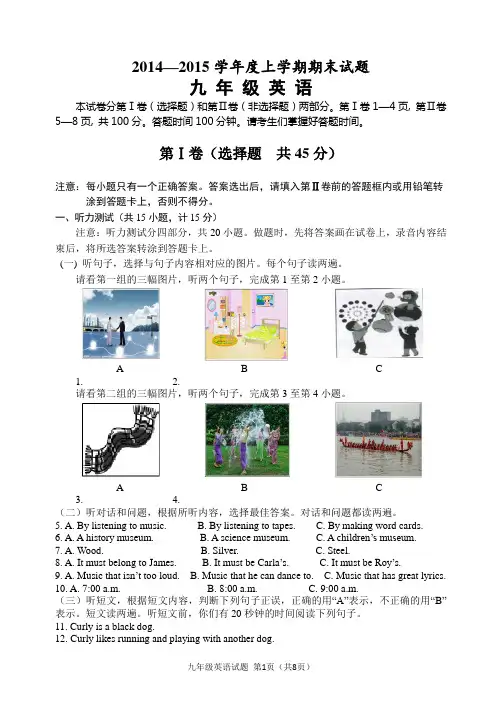
2014—2015学年度上学期期末试题九年级英语本试卷分第Ⅰ卷(选择题)和第Ⅱ卷(非选择题)两部分。
第Ⅰ卷1—4页, 第Ⅱ卷5—8页, 共100分。
答题时间100分钟。
请考生们掌握好答题时间。
第Ⅰ卷(选择题共45分)注意:每小题只有一个正确答案。
答案选出后,请填入第Ⅱ卷前的答题框内或用铅笔转涂到答题卡上,否则不得分。
一、听力测试(共15小题,计15分)注意:听力测试分四部分,共20小题。
做题时,先将答案画在试卷上,录音内容结束后,将所选答案转涂到答题卡上。
(一) 听句子,选择与句子内容相对应的图片。
每个句子读两遍。
请看第一组的三幅图片,听两个句子,完成第1至第2小题。
A B C1. ___________2. ___________请看第二组的三幅图片,听两个句子,完成第3至第4小题。
A B C3. ___________4. ___________(二)听对话和问题,根据所听内容,选择最佳答案。
对话和问题都读两遍。
5. A. By listening to music. B. By listening to tapes. C. By making word cards.6. A. A history museum. B. A science museum. C. A children’s museum.7. A. Wood. B. Silver. C. Steel.8. A. It must belong to James. B. It must be Carla’s. C. It must be Roy’s.9. A. Music that isn’t too loud. B. Music that he can dance to. C. Music that has great lyrics.10. A. 7:00 a.m. B. 8:00 a.m. C. 9:00 a.m.(三)听短文,根据短文内容,判断下列句子正误,正确的用“A”表示,不正确的用“B”表示。
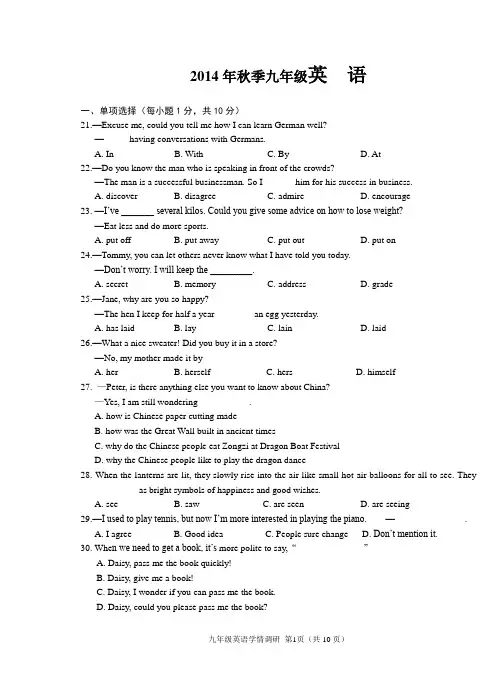
2014年秋季九年级英语一、单项选择(每小题1分,共10分)21.—Excuse me, could you tell me how I can learn German well?—_____ having conversations with Germans.A. InB. WithC. ByD. At22.—Do you know the man who is speaking in front of the crowds?—The man is a successful businessman. So I ______ him for his success in business.A. discoverB. disagreeC. admireD. encourage23. —I’ve _______ several kilos. Could you give some advice on how to lose weight?—Eat less and do more sports.A. put offB. put awayC. put outD. put on24.—Tommy, you can let others never know what I have told you today.—Don’t worry. I will keep the _________.A. secretB. memoryC. addressD. grade25.—Jane, why are you so happy?—The hen I keep for half a year ________an egg yesterday.A. has laidB. layC. lainD. laid26.—What a nice sweater! Did you buy it in a store?—No, my mother made it by ________A. herB. herselfC. hersD. himself27.—Peter, is there anything else you want to know about China?—Yes, I am still wondering___________.A. how is Chinese paper cutting madeB. how was the Great Wall built in ancient timesC. why do the Chinese people eat Zongzi at Dragon Boat FestivalD. why the Chinese people like to play the dragon dance28. When the lanterns are lit, they slowly rise into the air like small hot-air balloons for all to see. They________ as bright symbols of happiness and good wishes.A. seeB. sawC. are seenD. are seeing29.—I used to play tennis, but now I’m more interested in playing the piano.—_______________.A. I agreeB. Good ideaC. People sure changeD. Don’t mention it.30. Whe n we need to get a book, it’s more polite to say,“______________”A. Daisy, pass me the book quickly!B. Daisy, give me a book!C. Daisy, I wonder if you can pass me the book.D. Daisy, could you please pass me the book?二、完形填空(每小题1分,共15分)AEaster is a happy time in western countries like the UK and the USA. After Christmas, it is the most interesting holiday. It is begun as an important religious(宗教的) festival, but for the non-religious it is 31 a special time. It is an official holiday, so most people visit their families or friends during Easter.The most important Easter tradition is giving each other Easter eggs, because eggs are the symbol of new life. In the past people 32 paint chicken eggs, but today they give each other chocolate eggs.A fun game during the festival is that parents hide chocolate 33 in the garden, and the children go out to look for them. They can eat what they find! It’s quite normal for children to be 34 after Easter weekend as a result of eating too much chocolate.The holiday is always on a Sunday 35 March 22nd and April 25th.31. A. too B. also C. either D. as well32. A. got used to B. was used C. used to D. was used to33. A. eggs B. candy C. chicken D. apples34. A. ugly B. angry C. sick D. hungry35. A. after B. between C. among D. fromBFor this month’s Young World magazine, I interviewed 19-year-old 36 pop star Candy Wang. Candy told me that she used to be really shy and took up singing to deal with her 37 . As she got better, she dared to sing in front of her class, and then for the whole school. Now she’s not shy any more and 38 singing in front of crowds.I asked Candy how life was different 39 she became famous. She explained that there are many good things, like being able to travel and meet new people all the time. “I didn’t use to be popular in school, but now I get tons of 40 everywhere I go.” However, too much attention can also be a bad thing. “I always have to worry about how I appear to others and I have to be very careful about what to say or do. And I don’t have much private time anymore. Hanging out with friends is almost41 for me now because there are always guards around me.”What does Candy have to say to all those young people who want to become famous? “Well,” she begins slowly, “you have to be prepared to42 your normal life. You can never imagine how 43 the road to success is. Many times I thought about giving up, 44 I fought on. You really require a lot of talent and hard work to succeed. Only 45 people make it to the top. B. Asian C. America D. Africa37.A.shyness B. illness C. sadness D. happiness38.A. refuses B. dislikes C. minds D. loves39.A. after B. before C. since D. until40.A. money B. chance C. attention D. introduction41.A. possible B. possibly C. impossible D. impossibly42.A. give up B. give in C. give out D. give away43.A. exciting B. easy C. important D. difficult44.A. and B. but C. so D. for45.A.the number of B. a large number of C. a small number of D. a number of三、阅读理解(每小题2分,共30分)AHave you ever heard of Weifang, Shangdong Province? What is it known for? There is an international kite festival every April in Weifang that is a modern city with many traditions. People from all over the world compete in the kite flying. There are also competitions for the best kites. The kites in the competition are all made by hand.Most people have flown a kite. It makes people happy. It’s easy to make it. It’s made of bamboo and paper. But not so many people know that kites were first made in China thousands of years ago. The ancient Chinese made and flew kites even before they could write.A long time ago, the Chinese made kites to use in wars. They would fly these war kites in the dark. The kites were fixed and they made strange sounds in wind. Men who were at war against them would hear these sounds and run away. They thought those strange sounds were made by gods in the sky.The ancient Chinese also flew kites to bring good luck and to make their crops grow rich and tall. Sometimes they tied long strings and hooks(钩子) to their kites. Then they would fly the kites over water, letting the hooks hang down to catch fish.The Chinese use sticks, string and paper for their kites. Some of these kites look like animals or trees and others look like houses.46. Chinese made and flew kites ___________.A. two thousand years agoB. before they could writeC. after they writeD. three thousand years ago47. The main idea of the first paragraph is “____________”.A. the city WeifangB. the international kite festivalC. how to make a kiteD. how to fly a kite48. In ancient China kites could be used for __________.A. helping people flyB. playing gamesC. watering cropsD. catching fish49. The ancient Chinese used kites in wars because the kites __________.A. could bring good luckB. looked like animals.C. could make strange sounds and help them in a war.D. could brought light in the dark for them.50. _________ are used for making kites by the Chinese.A. Paper and plasticB. String and paperC. Sticks, string and paperD. String and hooksBI used to hate my mother because she worked a lot and didn’t spend much time with me. Then one Friday morning I took part in a three-day self-help program for teenagers. Whether you believe it or not, that weekend changed my life.About 100 other teenagers were there. During the first two days I met a lot of great people. I was glad because I made so many friends there.On Sunday, the leader did an interesting exerc ise called “Chocolate or Toys”. He asked a girl which she liked better, chocolate or toys. She chose chocolate. Then he asked her to choose again between chocolate and chocolate. Of course, she didn’t have a choice.This exercise told us that sometimes we don’t have a choice in life, and that sometimes we have to accept something, rather than complaining(抱怨).A girl stood up and started talking about her mom who was a drug addict (吸毒者)and how much she hated her mother.“I want a new mom,” she cried.“Un luckily, you can’t have one,” the leader replied.“You have to accept the mother that you have.”This hit me hard. I realized that, for better or worse, my mom was my mom. I couldn’t choose another mom, but I could try to make the best of the situation.51. The writer used to hate his mother because ________.A. she didn’t care for him.B. she had no time to be with himC. she was a drug addict.D. she was too strict with him.52. The self-help program for teenagers lasted ___________.A. a weekB. two daysC. three daysD. only one day53. The writer started to change his thinking ___________.A. during the first two days of the programB. after the exercise named “Chocolate or Toys”C. as soon as he came to the programD. after he left the program some time54. From the end of the passage, we can know that ____________.A. the writer used to love his mom for yearsB. the writer’s mom is a very bad personC. the writer’s mom loves her son very muchD. the writer will try to get along with his mother55. What is the main idea of this passage?A. Choices can be made as we likeB. Everyone should take part in a self-help programC. Chocolate can influence one’s attitude toward things.D. We should try to accept things instead of complaining about them.CWhat is the hottest English word of 2013? It’s “selfie”, according to Oxford dictionaries. Selfie is a photo that one takes of oneself, according to the Oxford online dictionary. People usually take selfies with a smartphone(智能手机) and send them to a social media website.The word was first used in 2002. In the past 12 months, its frequency (出现频率) in the English language has increased by 17,000 percent, said Oxford dictionaries. Now, almost everybody knows it.“Almost every day, I take a photo of myself at school, and save it in my Qzone (QQ空间),” said Huang Xu, 13, from Hunan. These photos record her happy and sad moments.Pop stars also take a lot of selfies. Li Chunping, 14, from Harbin, is a big fan of Yang Mi. “Sh e has used many selfies to tell us what’s going on in her personal life,” said Li.What makes people love selfies? Some people say it’s narcissism (自恋). “The rise of the selfie is a perfect symbol for our narcissistic culture. We’re crying out: Look at me!” said US psychiatrist(精神科医生) Carole Lieberman.Young people are using selfies to make friends online, Jonathan Freedland wrote in The Guardian. “The usual purpose of taking a selfie is to share online. They express a human need to connect with oth ers,” wrote Freedland.Huang Xu agrees with that. “During summer vacation, my classmates and I shared many selfies online. Hair or clothes were not our interests. Through these photos, we got to know each other’s holidays and feelings,” said Huang Xu.56. According to the story, a “selfie” is __________.A. a person with a smartphoneB. a smartphone which can take photosC. a photo taken by oneselfD. an English dictionary57. When was the word “selfie” first used?A.More than ten years agoB. In 2013C. When smartphones appearedD. Nobody knows58. We can tell from the story that __________.A. only famous people enjoy taking selfiesB. all people love selfies because of narcissismC. people love to share selfies onlineD. US psychiatrist Ca role Lieberman hates selfies59. We put the sentence “But some people don’t see it that way” at the beginning of ___________.A. Paragraph 4B. Paragraph 5C. Paragraph 6D. Paragraph 760. What is the best title of this passage ?A. Selfies and narcissismB. Selfies and sharingC. Selfies and smartphonesD. Selfies, the hottest word in 2013四、阅读填空(每小题1分, 共5分)In class, your teachers will talk about topics that you are studying. The information they provide will be important for you when you take tests. So you must take good notes from what your teachers say.Here are the three stages(阶段) of taking notes and what you should do during each stage.1. Before ClassReview your notes you have taken before you come to class. This will be good for remembering what was covered. Get you ready to understand new information your teacher will provide.2. During ClassKeep your attention on what your teacher is saying and “the signal words” that tell you, what your teacher is going to say and it is important to write in your notes. Examples of signal words are “The most important point…” and “Remember that…” Be sure to include the information that your teacher repeats or writes on the blackboard. Write quickly so that you can include all the important information in your notes. Do this by writing abbreviations(缩略词)such as med for medicine, using symbols such as % for percent, and writing short sentences.3. After ClassRewrite your notes to make them more complete and accurate(准确的) by changing abbreviations into whole words, symbols into words, and shortened sentences into longer sentences. Use them to answer your questions. If necessary, ask your teacher for help.Taking notesReasons The information that is provided by the teachers about 61 topics is usefulfor your tests, so it is necessary for you learn to take good notes.Stages62 Class●Review the notes you have taken to remember63 was covered.●Ready to understand new information.During Class●Listen to your teacher carefully.●Be sure to include the important points.●Write them down 64 .After Class●Make your notes more complete and accurate toanswer your questions.●Ask your 6 5 for help.五、选词填空 (每空1分,共10分)根据下面短文内容,从方框中选择适当的词并用其正确形式填空,使短文完整、通顺。
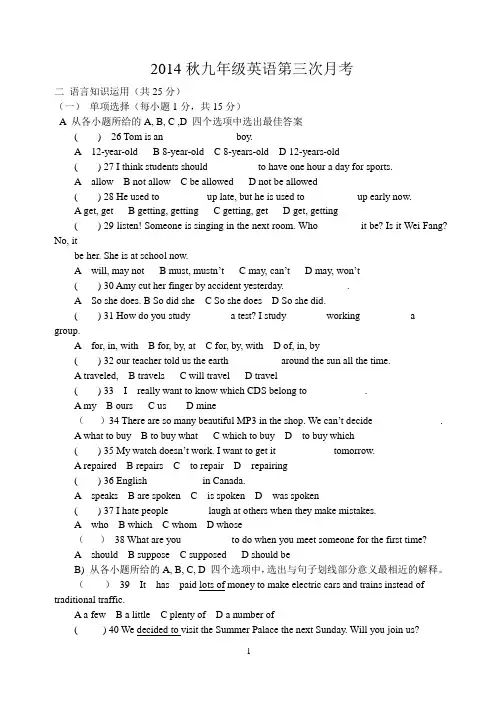
2014秋九年级英语第三次月考二语言知识运用(共25分)(一)单项选择(每小题1分,共15分)A 从各小题所给的A, B, C ,D 四个选项中选出最佳答案( ) 26 Tom is an ______________boy.A 12-year-oldB 8-year-oldC 8-years-oldD 12-years-old( ) 27 I think students should _________ to have one hour a day for sports.A allowB not allowC be allowedD not be allowed( ) 28 He used to _________up late, but he is used to __________up early now.A get, getB getting, gettingC getting, getD get, getting( ) 29 listen! Someone is singing in the next room. Who ________it be? Is it Wei Fang? No, it _____be her. She is at school now.A will, may notB must, mustn’tC may, can’tD may, won’t( ) 30 Amy cut her finger by accident yesterday. ____________.A So she does.B So did sheC So she doesD So she did.( ) 31 How do you study _______ a test? I study _______ working _________ a group.A for, in, withB for, by, atC for, by, withD of, in, by( ) 32 our teacher told us the earth __________around the sun all the time.A traveled,B travelsC will travelD travel( ) 33 I really want to know which CDS belong to ___________.A myB oursC usD mine()34 There are so many beautiful MP3 in the shop. We can’t decide _____________.A what to buyB to buy whatC which to buyD to buy which( ) 35 My watch doesn’t work. I want to get it ___________tomorrow.A repairedB repairsC to repairD repairing( ) 36 English __________ in Canada.A speaksB are spokenC is spokenD was spoken( ) 37 I hate people _______ laugh at others when they make mistakes.A whoB whichC whomD whose()38 What are you _________ to do when you meet someone for the first time?A shouldB supposeC supposedD should beB) 从各小题所给的A, B, C, D 四个选项中,选出与句子划线部分意义最相近的解释。
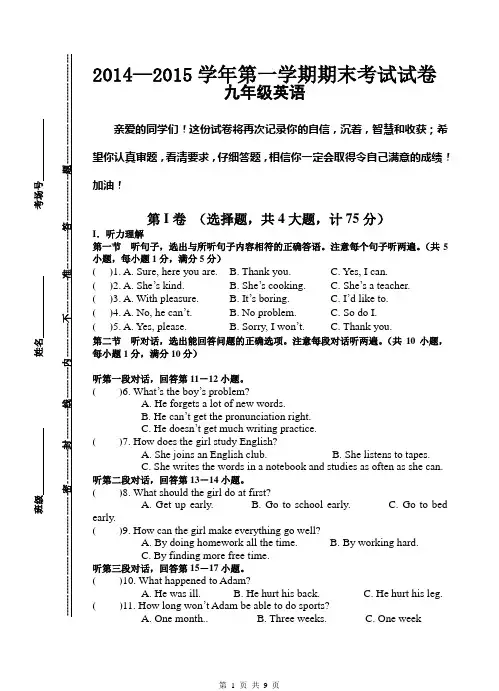
2014—2015学年第一学期期末考试试卷九年级英语亲爱的同学们!这份试卷将再次记录你的自信,沉着,智慧和收获;希望你认真审题,看清要求,仔细答题,相信你一定会取得令自己满意的成绩!加油!第I卷(选择题,共4大题,计75分)I.听力理解第一节听句子,选出与所听句子内容相符的正确答语。
注意每个句子听两遍。
(共5小题,每小题1分,满分5分)( )1. A. Sure, here you are. B. Thank you. C. Yes, I can.( )2. A. She’s kind. B. She’s cooking. C. She’s a teacher.( )3. A. With pleasure. B. It’s boring. C. I’d like to.( )4. A. No, he can’t. B. No problem. C. So do I.( )5. A. Yes, please. B. Sorry, I won’t. C. Thank you.第二节听对话,选出能回答问题的正确选项。
注意每段对话听两遍。
(共10小题,每小题1分,满分10分)听第一段对话,回答第11-12小题。
( )6. What’s the boy’s problem?A. He forgets a lot of new words.B. He can’t get the pronunciation right.C. He doesn’t get much writing practice.( )7. How does the girl study English?A. She joins an English club.B. She listens to tapes.C. She writes the words in a notebook and studies as often as she can. 听第二段对话,回答第13-14小题。
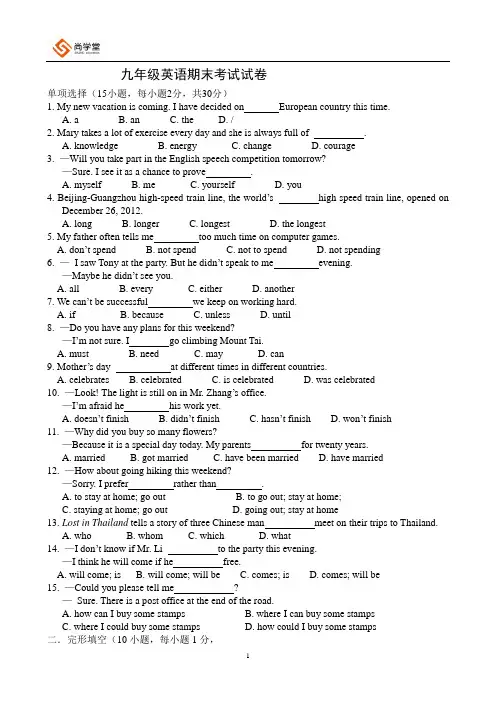
九年级英语期末考试试卷单项选择(15小题,每小题2分,共30分)1. My new vacation is coming. I have decided on European country this time.A. aB. anC. theD. /2. Mary takes a lot of exercise every day and she is always full of .A. knowledgeB. energyC. changeD. courage3. —Will you take part in the English speech competition tomorrow?—Sure. I see it as a chance to prove .A. myselfB. meC. yourselfD. you4. Beijing-Guangzhou high-speed train line, the world’s high speed train line, opened onDecember 26, 2012.A. longB. longerC. longestD. the longest5. My father often tells me too much time on computer games.A. don’t spendB. not spendC. not to spendD. not spending6. —I saw Tony at the party. But he didn’t speak to me evening.—Maybe he didn’t see you.A. allB. everyC. eitherD. another7. We can’t be successful we keep on working hard.A. ifB. becauseC. unlessD. until8. —Do you have any plans for this weekend?—I’m not sure. I go climbing Mount Tai.A. mustB. needC. mayD. can9. Mother’s day at different times in different countries.A. celebratesB. celebratedC. is celebratedD. was celebrated10. —Look! The light is still on in Mr. Zhang’s office.—I’m afraid he his work yet.A. doesn’t finishB. didn’t finishC. hasn’t finishD. won’t finish11. —Why did you buy so many flowers?—Because it is a special day today. My parents for twenty years.A. marriedB. got marriedC. have been marriedD. have married12. —How about going hiking this weekend?—Sorry. I prefer rather than .A. to stay at home; go outB. to go out; stay at home;C. staying at home; go outD. going out; stay at home13. Lost in Thailand tells a story of three Chinese man meet on their trips to Thailand.A. whoB. whomC. whichD. what14. —I don’t know if Mr. Li to the party this evening.—I think he will come if he free.A. will come; isB. will come; will beC. comes; isD. comes; will be15. —Could you please tell me ?—Sure. There is a post office at the end of the road.A. how can I buy some stampsB. where I can buy some stampsC. where I could buy some stampsD. how could I buy some stamps二.完形填空(10小题,每小题1分,A man and his wife had a dog to keep their house. When they went out, they always left the dog inside the house.One evening they wanted 1 to the cinema, 2 they left the dog in the house and locked the door and their 3 . They 4 their car.When the film finished, they came back home. They opened the gate and put the car 5 . But when they came to the front door, they found that part of the glass 6 the door was broken. The door was unlocked and 7 . A robber! They went in and quickly looked in all the rooms to see 8 things the robber had taken. But everything was in the 9 place and nothing at all 10 .The dog 11 in the sitting room on the floor. The lady was 12 the dog. “Why didn’t you keep the house?” she said. The dog was13 to see its owners. It began to wag its tail (摇尾巴) and then it went to a corner of the room and picked up something in its mouth. It went to the lady and 14 the thing at her feet. When the lady went to pick it up, she gave a scream (尖叫). Can you guess what the dog’s present was?It was … a … man’s 15 !(1) A. go B. to go C. going D. gone(2) A. so B. but C. then D. because(3) A. garden’s gate B. gardens’ gate C. ga rdens gate D. garden gate(4) A. got off B. got on C. got into D. went on(5) A. up B. down C. away D. into(6) A. at B. in C. on D. to(7) A. half-open B. half-opens C. half-opened D. half-opening(8) A. the B. all C. that D. what(9) A. right B. left C. wrong D. just(10) A. to miss B. to be missing C. was missed D. was missing(11) A. was slept B. felt asleep C. was sleeping D. fell sleeping(12) A. afraid of B. angry with C. worried about D. surprised at(13) A. sad B. pleased C. quick D. clever(14) A. pulled B. threw C. dropped D. took(15) A. finger B. fingers C. heart D. teeth三.阅读理解(20小题,每小题2分,共40分)阅读下面四篇语言材料,然后按文后要求做题。
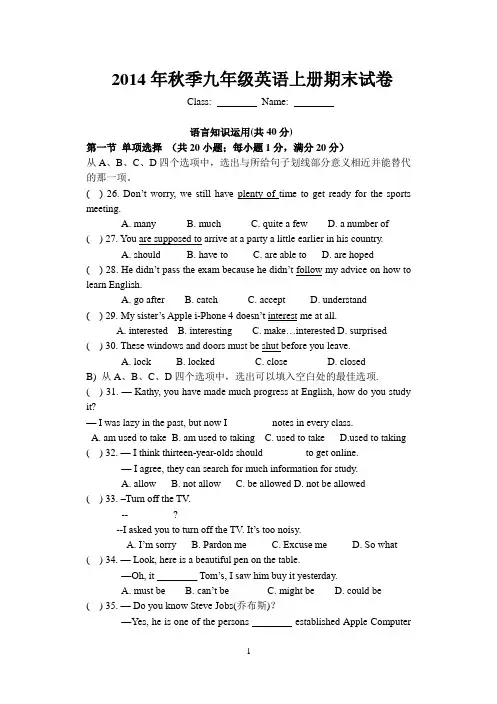
2014年秋季九年级英语上册期末试卷Class: Name:语言知识运用(共40分)第一节单项选择(共20小题;每小题1分,满分20分)从A、B、C、D四个选项中,选出与所给句子划线部分意义相近并能替代的那一项。
( ) 26. Don’t worry, we still have plenty of time to get ready for the sports meeting.A. manyB. muchC. quite a fewD. a number of ( ) 27. You are supposed to arrive at a party a little earlier in his country.A. shouldB. have toC. are able toD. are hoped( ) 28. He didn’t pass the exam because he didn’t follow my advice on how to learn English.A. go afterB. catchC. acceptD. understand( ) 29. My sister’s Apple i-Phone 4 doesn’t interest me at all.A. interestedB. interestingC. make…interestedD. surprised ( ) 30. These windows and doors must be shut before you leave.A. lockB. lockedC. closeD. closedB) 从A、B、C、D四个选项中,选出可以填入空白处的最佳选项. ( ) 31. — Kathy, you have made much progress at English, how do you study it?— I was lazy in the past, but now I ________ notes in every class.A. am used to takeB. am used to takingC. used to takeed to taking ( ) 32. — I think thirteen-year-olds should ________to get online.— I agree, they can search for much information for study.A. allowB. not allowC. be allowedD. not be allowed( ) 33. –Turn off the TV.--_________?--I asked you to turn off the TV. It’s too noisy.A. I’m sorryB. Pardon meC. Excuse meD. So what ( ) 34. — Look, here is a beautiful pen on the table.—Oh, it ________ Tom’s, I saw him buy it yesterday.A. must beB. can’t beC. might beD. could be ( ) 35. — Do you know Steve Jobs(乔布斯)?—Yes, he is one of the persons ________ established Apple ComputerCompany.A. whoseB. whomC. whichD. who( ) 36. — Carmen, do you know many people refuse to buy Japanese things?— Great! I think ________ happens, the fact Diaoyu Island belongs to China will never change.A. WhereverB. WheneverC. WhateverD. Whoever ( ) 37. —Why can’t I see Mary at the party? Is she ill?—No, she isn’t. But perhaps she ________ invited.A. wasB. isC. was not D is not( ) 38. — Excuse me, can I interview your boss this afternoon?—Oh, wait a moment! Let me check _________ .A. if he will be freeB. when will he have timeC. if he had an appointmentD. when does he come back ( ) 39. —I am afraid that we can’t win the match tomorrow.—_________ ! I’m sure We’ll make it.A. No problemB. Cheer upC. Don’t mention itD. Set up ( ) 40. —Sally, why was your brother so sad?— His classmates_________ to the zoo without waiting for him when he arrived at school.A. have goneB. had goneC. have been awayD. had been away ( ) 41. —Dad, what did the doctor told you?— He said I would not be healthy again _________ I give up smoking and drinking.A. whenB. afterC. unlessD. if( ) 42. —________Mary ________ Tom is a volunteer to help the sick children yesterday.— Yeah, they told stories to make the children happy..A. Both, andB. Not only, but alsoC. Neither, norD. Either, or ( ) 43. We prefer ________at the party rather than______.A. to sing; danceB. to sing dancingC. sing; to danceD. sing dance( ) 44. — Elise, where would you like to visit for the coming holiday?—Oh, no, I prefer _________ fishing to _________ somewhere far, I need to relax.A. go, travelB. going, travelingC. to go, travelD. to go, traveling ( ) 45. — Maria, could you come and spend the weekend with us?— ________ I have to prepare for my coming exam.A. I hope soB. I agreeC. I'm afraid I can'tD. I’m afraid so.第二节:完形填空(共20小题;每小题1分,满分20分)阅读下面短文,从短文后所给的四个选项中,选出可以填入空白处的最佳选项。
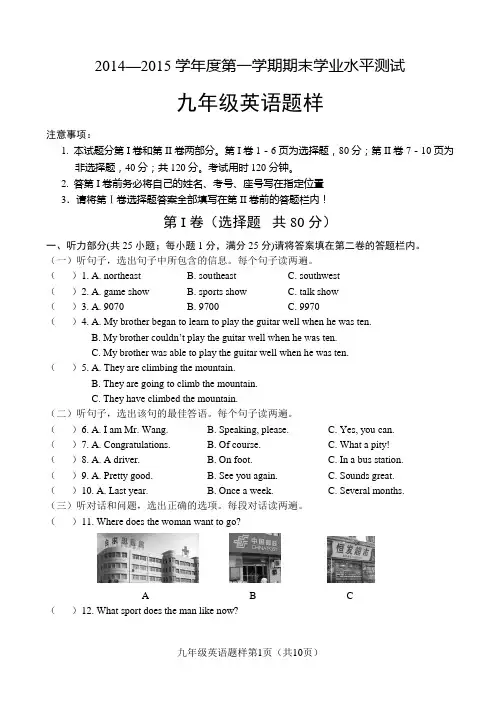
2014—2015学年度第一学期期末学业水平测试九年级英语题样注意事项:1. 本试题分第I卷和第II卷两部分。
第I卷1-6页为选择题,80分;第II卷7-10页为非选择题,40分;共120分。
考试用时120分钟。
2. 答第I卷前务必将自己的姓名、考号、座号写在指定位置3.请将第Ⅰ卷选择题答案全部填写在第II卷前的答题栏内!第I卷(选择题共80分)一、听力部分(共25小题;每小题1分,满分25分)请将答案填在第二卷的答题栏内。
(一)听句子,选出句子中所包含的信息。
每个句子读两遍。
()1. A. northeast B. southeast C. southwest()2. A. game show B. sports show C. talk show()3. A. 9070 B. 9700 C. 9970()4. A. My brother began to learn to play the guitar well when he was ten.B. My brother couldn’t play the guitar well when he was ten.C. My brother was able to play the guitar well when he was ten.()5. A. They are climbing the mountain.B. They are going to climb the mountain.C. They have climbed the mountain.(二)听句子,选出该句的最佳答语。
每个句子读两遍。
()6. A. I am Mr. Wang. B. Speaking, please. C. Yes, you can.()7. A. Congratulations. B. Of course. C. What a pity!()8. A. A driver. B. On foot. C. In a bus station.()9. A. Pretty good. B. See you again. C. Sounds great.()10. A. Last year. B. Once a week. C. Several months.(三)听对话和问题,选出正确的选项。
2014—2015学年度第一学期期末考试初三英语试题第I 卷 选择题(共55分)一 听力选择 (每题一分,共计15分)(一)听句子,选择最佳答语, 每个句子读一遍。
1. A. Since the Ming Dynasty. B. I t‟s my pleasure. C. About 8850 km 2. A. Y es, they are. B. China. C. I like China. 3. A . Thank you. B. Welcome back. C. Not yet. 4. A. Because I don ‟t read it any more B. Because I don ‟t wear it any more. C. I like it very much. 5. A. So have we. B. Neither have we. C Me, too. (二)听下面五段对话,选择最佳答案。
每段对话读两遍。
6. How long have they been in China? A.Two years ago. B.In two years. C. For three years. 7. Has Linda been to Beijing? A. Y es, she has. B. No, she hasn ‟t. C. Y es, she have. 8. Which is the largest lake in China? A. Qinghai Lake. B. Dongting Lake. C. Poyang Lake. 9. What should the boy do first?A. Play with his friends.B. Clean his room.C. Finish his homework. 10. How did the boy get the dictionary? A. His father gave it to him. B. He bought it.C. He borrowed it from his teacher.(三)录音中有一篇短文,听短文两遍,选出能回答每个问题的正确答案。
2014年秋学期九年级英语试题(考试时间:120分钟满分:150分)一、听力部分(共20小题;每小题1分,满分20分)第一部分:听对话回答问题本部分共有10道小题,每小题你将听到一段对话,每段对话听两遍.在听每段对话前,你将有5秒钟的时间阅读题目;听完后,选出你认为最合适的备选答案。
1. What does the girl see?A。
B。
C.2. What is Peter’s animal sign?A。
B。
C.3。
How does Jack usually go to school??A。
B。
C。
4。
How much should the girl pay for the hair clips?A. B. C.5。
Does Tom believe in star signs?A。
No,he doesn’t. B. Yes, he does。
C. We don’t know。
6。
What is Miss Green like?A. Creative。
B. Active.C. Organized.7。
Who would rather sleep than watch TV on rainy days?A。
The girl。
B. Tom。
C. Neither of them.8。
Where did the dialogue most likely happen?A。
In the library. B。
At home. C. At the teacher s’ office。
9. When did the dialogue most probably take place?A。
In winter。
B。
In autumn. C. In spring.10。
Why do some teenagers feel stressed?A。
They have too many exams.B。
They have too much homework to do。
年九(上)人教版英语期末试题(含答案)考试时间:90分钟满分:120第I卷选择题(90分)e ,will comeB.will come, will comeC.will come,comesLet’s go out for a walk.better _________ English our teacher’s help.B. at; inC. in; with—At 8:00 a.m.shirt and tie.on her study because she believes __ she does, __ she’ll be.clean river in front of my house, but now everything has changed.B. Yao KaiC. his).This salad is made fruits and it .A. of; smells wellB. from; is smelled wellC. of; smells good( )16. I think the train was _________ at 7:40, but it was late.A. supposed gettingB. supposing to arriveC. supposed to arrive( )17. ---"Would you like something to drink ?--- . I'd like something to eat.A. Yes, pleaseB. No, thanksC. That's all right( )18.---Mrs Li, will you be angry your students don't keep the rules in class?--A little, but I'll stop them nicely.A. withB. unlessC. if( )19. good advice! Miss Green, thank you. Finally I know what's wrong with my study.A. HowB. WhatC. What a( )20.The MP3 is used for _______ music.A. listen toB. listeningC. listening to二、完形填空(20分)AMrs. Black was a famous musician a few years ago. She 21 music at a school and her students did well in their lessons. They liked her very much. Now the old woman stays at home with her husband. The old man looks after his wife well and she 22 worries about anything. And she is very 23 .Just like some old people, Mrs. Black finds that her memory(记忆) is falling. Sometimes she 24 what she did or will do. It often gets her in trouble. Her 25 noticed (注意到) it and asked her to see a famous doctor. He bought two tickets 26 London and told her he put 27 into her handbag while she was playing the piano. The next morning, they got to the 28 just on time to catch the plane. Mrs. Black said,“I wish we had the 29 with us.”“Don’t be a fool, dear!”said Mr. Black,“We are not going to a concert, but to see a 30 .”“I know,”she said,“but I left the tickets on it!”( )21.A. loved B. taught C. enjoyed( )22.A. always B. often C. never( )23.A. sorry B. worried C. happy( )24.A. forget B. remember C. forgets( )25.A. husband B. daughter C. son( )26.A. to B. in C. from( )27.A. it B. them C. this( )28.A. airport B. bus stop C. station( )29.A. money B. piano C. tickets( )30.A. doctor B. film C. playBAnne is a newspaper reporter. She chose this 31 so she could travel around the work has taught her many unforgettable lessons. She has seen wars, earthquakes and death. But she has 32 seen courage, hope and happiness.Last year, she won an award for her reporting in Africa. She was very proud 33 she thought she got the award because of her good work. But then she realized that she should thank many other people for 34 help.Anne was born in Jamaica. Her family was not poor, but it was not 35 , either. Her parents had to 36 hard so that she could go to school. At school, Anne was not a student, 37 she enjoyed writing because her English teacher said, “Anne, you are a wonderful 38 .” The teacher encouraged her all the time.went to university in Canada and then 39 for a job. It was very difficult.a job. “Everyone needs a 40 at first.” he said.50分)test is one of the most important parts of the English exam. Here are some tipsmuch time on them. Very often, you’ll find out what they mean later when you go on with the listening.( )41.This passage mainly talks about_________.A. tips on listeningB. tips on speakingC. tips on reading( )42.It’s better for you to kee p ________when you start to have a listening test.A. excitedB. relaxedC. stressed out( )43. We should listen to the first sentence carefully, because it usually tells us________.A. the answers to the questionsB. where to write the answersC. the main idea of the passage( )44.When you’re listening, it’s important for you to_________.A. remember every wordB. take some notesC. understand all the words( )45. The _______ usually help(s) us understand the passage better.A. questionsB. first sentenceC. notesBA man stopped his car at the door of a flower shop. He planned to order flowers and asked the shopkeeper to deliver (递送) them to his mother, who was far awa y in the man’s hometown.The man saw a little girl crying on the road when he was about to enter the shop. The man asked her: “Why are you crying?”“I want to buy a rose for my mother, but I haven’t got enough money,” said the girl. The man took the girl’s hand and entered the flower shop. He first ordered the bouquet (花束) for his mother and bought a rose for the girl.Walking out of the shop, the man asked the girl if she would like a ride home.“Will you really drive me home?” she asked.“Of course,” the man replied.“Then drive me to my mother. But the place is very far.”The man drove along the mountain road and finally came to the cemetery (墓地).The little girl put the flower onto a new grave. In order to present a rose to her mother who had passed away a month before, she had gone on a very long journey.The man drove the girl to her home and then returned to the flower shop. He cancelled the bouquet and bought a big bunch of fresh flowers instead. He drove directly to his mother’s home, a five-hour drive from where he was. He would present the flowers to his mother in person.( )46.Whom did the man go to a flower shop to order flowers for?A. His girlfriend.B. His mother.C. His wife.( )47.Why was the little girl crying?A. She lost her way home.B. She was late for school.C. She couldn’t afford a rose.( )48.What changed the man’s mind?A. Roses in the shop.B. The girl’s behavior.C. The girl’s mother.Cshould have good study habits. When you have good study habits, you can learn容易地).to study in the living-room? This is not a good place because it is usuallyquiet place, like your bedroom. A quiet place will helpt much light .B. 吵闹的C.热闹的标题) of this passage is _______________.Dis for everyone. You don’t need to care about those people who have beautifulschool, your friends will help you; when you study hard at your lessons, your will say congratulations to you; when you do something wrong, people around All these are your happiness. If you notice them, you can see that happiness say you are very happy, because you have something else that can't be bought with money. you cannot always say you are poor and you have bad luck. As the saying goes, life is like a revolving (旋转) door. When it closes, it also opens. If you take every chance you get, you can be a happy and lucky person.( )56.Happiness is for_________.A. those who have large and beautiful housesB. those who have carsC. all people( )57.When you do something wrong, .A. people around you will help youB. you will have no chance to challenge yourselfC. your classmates will laugh at you( )58.Which is true according to the passage?A. When you get success, your friends will be very proud of you.B. You can get help from others when you make mistakes.C. Both A and B( )59.Why do we say "Happiness is not the same as money"? Because .A. money always brings happinessB. money doesn't always bring happinessC. everything can be bought with money( )60.Which is the title of the passage? ____________.A. HappinessB. Happy and LuckyC. Do Something Good to OthersEAs young students, you have many dreams. These dreams can be very big, such as winning the Nobel Prize; they can also be small, such as becoming one of the best students in your class. Once you find a dream, what do you do with it ? Do you ever try to make your dream real?Andrew Matthews, an Australian wri ter, tells us that making your dreams real is life’s biggest challenge. You may think you’re not very good at some school subjects, or that it’s impossible for you to become a writer. Those kinds of ideas stop you from realizing your dream.In fact, everyone can realize his dream. The first thing you must do is to remember what your dream is. Don’t let it leave your heart. Keep telling yourself what you want every day and then your dream will come true faster. You should know that a big dream is, in fact, made up of many small dreams.You must also never give up your dream. There will be difficulties on the road to your dreams. But the biggest difficulty comes from yourself. You need to decide what is the most important. Studying instead of watching TV will help you to get better exam results, while saving five yuan instead of buying an ice cream means you can buy a new book. As you get closer to your dream, it may change a little. This is good as you have the chance to learn something more useful and find new hobbies.( )61.Which of the following isn’t mentioned in this passage?A: You look sad, what happened?B: 76. .A: Why do they do that?B: 77. . They were angry, and asked me to study harder even on weekends. A: Maybe they are just worried about you.B: Yeah, but I just have trouble learning English. 78. .A: Just memorize the new words, review the notes and do more exercises.B: 79. .I don't know what to do then.A: For the words, you can just guess the meaning by reading the sentences before and after it.B: That sounds difficult.A: 80. .B: I'll try, thank you.七、书面表达(15分)81.最近某校将举行“Wear school uniforms or not ”的辩论赛。
2014学年第一学期九年级期末质量检测英语卷 一说明:本卷共三大题,45小题,满分70分。
第一部分 听力部分一、听力(本题有15小题,第一节每小题1分,第二、三节每小题2分;共计25分)第一节:听小对话,从题中所给的A 、B 、C 三个选项中选出最佳选项。
1. What time will Miss Li arrive here?2. Which sign are they talking about?3. Where is Tom ’s teacher from?4. How did Paul go to Shanghai on vocation?A..C.A.B.C.A.B.C.A.B.C .5. What brand of jacket is Mike wearing?第二节:听较长对话, 从题中所给的A 、B 、C 三个选项中选出最佳选项。
听下面一段对话,回答第6~7两个小题。
6. What are they talking about? A. An English word. B. A Chinese word. C. A Korean word. 7. What does the word mean in Chinese? It means __________.A. the rich earthB. the rich people with good manners.C. the rich people without good manners听下面一段对话,回答第8~10三小个题。
8. What will Rose do to improve her English?A. Join an English club.B. Fly to Beijing.C. Learn by herself.9. What will Bill do in winter vocation?A. See Rose.B. Visit his grandparents.C. Improve his math.10. How long will Rose stay in Beijing?A. For a week.B. For two weeks.C. For a term.第三节:听独白,完成信息记录表。
2014学年第一学期期末英语测试试卷(一)听力部分一、听力(10分)I. 听小对话, 选择图片(共5小题;每小题1分,满分5分)1. What will the weather be like tomorrow?A. B. C.2. Which country won the championship?A. B. C.3. What time did the boy get to Mike’s home?A. B. C.4. What kind of instruments did Jane use to play?A. B. C.5. Which sign are they talking about?A. B. C.Ⅱ. 听长对话,回答问题(共5小题; 每小题2分,满分10分)听下面一段较长对话,回答第6~7两个小题。
6.Who are talking on the phone?A.Tom and Jack.B. Jack and Mrs BrownC.Tom and Mrs Brown.7.What are Tom and his friends going to do this Sunday morning?A.Plant trees.B.Have a party.C.See a film听下面一段较长对话,回答第8~10三个小题。
8.What’s wrong with Peter?A.He had a bad cold.B.His arm was broken.C.His leg was broken.9.Where did the accident happen?A.In the streetB.In the schoolC.In the hospital.10.How long does peter have to stay in hospital?A.A few days.B.A few weeks.C.A few months.III. 听短文,回答问题(共5小题; 每小题 2 分,满分10 分)11. Where did the story happen?A. In a book shop.B. In a clothing shop.C. In a fruit shop.12. What did the woman want to buy?A. A dress.B. A skirt.C. A sweater.13. How many times did the woman ask the girl?A. Once.B. Twice.C. Three times.14. How did the girl treat the woman ?A. Coldly.B. Warmly.C. Friendly.15. How did the girl feel when she heard the woman’s words?A. She felt happy.B. She felt surprised.C. She felt angry.(二)笔试部分二、单项选择(共15小题,每小题1分,计15分)16. ---What do you think of the cartoon? ----Oh, it is really ____ fantastic one.A. aB. anC. theD. /17. ---I want to go to buy some medicine. Is there a _________ near here?---Yes, there is one across from the post office.A. bookstoreB. drugstoreC. museumD. cinema18. ---There are many volunteers ______ are helping the children in Sichuan.--- And most of them are college students.A. whichB. whenC. whoseD. who19. ---Wo uld you ___________ turning down the music a little bit? It’s too noisy.---Of course not. I’ll do itright away.A. pleaseB. succeedC. likeD. mind20. ---Bruce, how did you like the movie you saw last night?---It was ___________. I left the cinema half way through it.A. thrillingB. relaxedC. boringD. creative21. ---Shall I take you to the shopping mall after work?--- No, thanks. My father said he would ___________ on his way home.A. look for meB. pick me upC. let me downD. take after me22. ---Listen! Kathy is playing the piano in the next room.---It_____ be Kathy. She has gone to Hangzhou to visit the Cross-sea Bridge.A. can’tB. mustn’tC. needn’tD. may notam late.23. ---May I come in? I’m sorry I---Come in, please. But could you please tell me ______?A. why you were late againB. why were you late againC. who you talked withD. how do you came to school24. ---Look at the sign on the right.---Oh, parking _______ here.allow B. isn’t allowedA. doesn’tC. didn’t allowD. wasn’t allowed25.---Daddy, will you come home for supper with us today?---_________ , but I might be a little late.m afraid not. D. It’s hard to sayA. I’m busyB. No problemC. I’三、完形填空(本题有15小题,每小题1分,共计15分)阅读下面短文,然后从各题所给的四个选项中选出一个最佳答案。
2014年秋九年级英语期末质量检测题Ⅰ.单项选择:(共20小题,计20分)从下列各题所给A、B、C、D四个选项中选择一个可以填入空白处的最佳答案。
( ) 1. is really hard them to climb Mount Huang.A. This, to.B. It, forC. This, forD. It, to( ) 2. If you don’t know a word, you must in a dictionary.A. look it upB. look up itC. look over itD. look it out( ) 3. The old man makes a living driving a taxi.A. onB. toC. forD. by( ) 4. Can you teach me the computer?A. how usingB. how to useC. what to useD. what using( ) 5. The fans were very excited______ David Beckham came to the show.A. soB. becauseC. butD. and( ) 6. the English club at school is the best way to improve our English.A. JoinB. JoinedC. JoiningD. Joins( ) 7. —What did you do on April Fool’s Day? — I played a trick _______ my brother.A. onB. toC. withD. at( ) 8. You should often practice , or you can’t win the game.A. runB. to runC. runningD. to running( ) 9. We will have two family parties this autumn. One is at Halloween and ________ is at Thanksgiving.A. otherB. the otherC. anotherD. the others( )10. —What’s the _________ of the car at present?—It’s abo ut 70 kilometers an hour.A. placeB. speedC. priceD. mark( )11. Jimmy is very helpful. _________ I stay with him, _________I like him.A. The more; the mostB. The most; the mostC. The more; the moreD. The most; the more( )12. — Why not listen to BBC news to improve your listening skills?_________ difficult for me _________ follow.—It’sA. too; toB. so; thatC. such; thatD. so; too( )13. —I haven’t got a partner _________ . — Maybe you can ask John for help.A. work withB. to workC. working withD. to work with( )14. _______ dangerous the animals are!A. What aB. WhatC. How aD. How( )15. — Do you have ________ in Beijing? — Yes. My aunt and uncle live there.A. classmatesB. cousinsC. partnersD. relatives( )16. —It’s dangerous to swim in this river.— Yes, you are right. The government has _________ people not to swim in it.A. trainedB. warnedC. ledD. encouraged( )17. I hate those people _______ talk much but do little.A.whom B.who C.which D.whose( )18.I often make mistakes ___________ grammar..A. byB. throughC. acrossD. inask Mr. Wang for ________ about the earthquake.( )19. Let’sA. an information B, informations C. some information D. some informations( )20. —Do you know _____ ? I'm going to see him. —Sorry, I don't know.A. where does Mr. Li liveB. where did Mr. Li liveC. where Mr. Li livesD. where Mr. Li livedⅡ. 完形填空(共20小题,计30分)阅读下面一篇短文,理解大意,然后从各小题的四个选项中选出一个最佳答案,使短文连贯完整。
酉阳县2014年秋季学期九年级教学质量检测英语试题(总分100分,考试时间90分钟)Ⅰ、听力测试(每小题1分,共20分)一、听句子,选择与句意相符的图片。
每个句子读两遍。
( ) 1.A.B.C.( ) 2.A.B.C.( ) 3.A.B.C.( ) 4.A.B.C.( ) 5. A.B.C.二、听句子,选择正确的应答语。
句子读两遍。
( ) 6. A. She has gone to Guangzhou. B. She is from Beijing.C. She did well in English.( ) 7. A. Yes, I do. B. You’re so kind. C. You’re welcome.( ) 8. A. I’m sorry to hear that. B. That’s boring. C. Not at all.( ) 9. A. You’d better not. B. It’s my pleasure. C. Sure, I’d love to.( ) 10. A. Sorry, I won’t. B. I’m tired. C. Nothing serious.三、听对话,选择正确答案。
对话读两遍。
(5分)( ) 11. Where did the man go yesterday afternoon?A. The gym.B. The playground.C. The library.( ) 12. How many students are there in the girl’s school?A. 1,500.B. 5,000.C. 5,500.( ) 13. How long has the girl had a bad cold?A. For two days.B. For four days.C. For five days.( ) 14. What kind of pollution affects Jane?A. Air pollution.B. Light pollution.C. Noise pollution.( ) 15. Why are there so many dead fish in the river?A. Because a chemical factory pours waste water into the river every day.B. Because people cut down the trees.C. Because the wind blows the earth away.四、听短文,选择正确答案。
短文读三遍。
( ) 16. Which of the following famous stars went to Yunnan to help the people there?A. Li Shuangjiang.B. Han Hong.C. Song Zuying.( ) 17. How much money did the love group give to the area?A. One million yuan.B. Two million yuan.C. Five million yuan.( ) 18. When did the love group leave for Yunnan?A. On August 3rd.B. On August 5th.C. On August 8th.( ) 19. How many people were there in the love group?A. 120.B. 180.C. 190.( ) 20. How long did the love travel last?A. A week.B. Ten days.C. Half a month.Ⅱ、单项选择(每小题1分,共10分)从A、B、C、D四个选项中选出可以填入空白处的最佳答案。
( ) 21. As the largest developing country, China since it was founded in 1949.A. made great progressB. has made great progressC. made a decisionD. has made mistakes( ) 22. Mr. Smith spoke slowly and clearly to make himself ______.A. understoodB. understandC. understandsD. understanding( ) 23. —We need to learn and work ______ we live.—I think so.A. as long asB. as much asC. as soon asD. as possible as( ) 24. —It’s a quarter to eight. The train is leaving.—She’ll be here on time. So ______.A. that sounds excitingB. there’s no need to worryC. what a messD. I can’t wait( ) 25. Don’t read in the sun. It’s ______ your eyes.A. harm toB. harm forC. harmful forD. harmful to( ) 26. —Why are you so excited?—Because I ______ my favorite star tomorrow.A. meetB. metC. am meetingD. have met( ) 27. My new laptop ______ metal and plastic. It was developed in 1985 in Japan.A. is made fromB. is made inC. is made ofD. is made by( ) 28. —Excuse me, could you tell me ______ get to the post office?—Sure, go down this street to the end.A. what toB. how toC. when toD. where to( ) 29. This is an interesting book ______ I have ever read.A. whoB. whomC. whatD. that( ) 30. —Guess what! Shanghai Disneyland will be open in 2015.—______A. It’s my pleasure.B. Take it easy.C. What fun!D. What’s up?Ⅲ、完形填空(每小题1分,共10分)根据短文内容,从A、B、D四个选项中选出一个能正确填入相应空格内的最佳答案。
Two thousand years ago, a famous Chinese man called Cai Lun invented paper. He took the wood from trees and ___31___ it into paper. Then people put pieces of paper ___32___ to make books.Today people still use ___33___ to make paper. As we know, we use ___34___ paper every day. And every minute people waste so much paper. It’s reported that in a middle city, people need to ___35___ about 2,800 tons of paper every day. To make one ton of paper needs 17 trees. That is to say, we ___36___ down nearly 48,000 trees every day. And it takes over 10 years for a tree to grow up. ___37___ we must use less and save paper now.What should we do to save paper? As students, we can use ___38___ side of the paper,especially when making notes. We can choose cloth bags ___39___ paper bags when we go shopping. Because we can use a cloth bag many times ___40___ a paper bag only once. We can also use cotton handkerchiefs(手帕) but not paper ones.Everyone can help to save paper and protect trees if he or she likes. Actions speak louder than words. Let’s do it now.( ) 31. A. threw B. made C. took D. put( ) 32. A. together B. up C. off D. away( ) 33. A. cloth B. litter C. wood D. forest( ) 34. A. a lot B. number of C. plenty of D. a few( ) 35. A. use B. take C. bring D. carry( ) 36. A. put B. lie C. slow D. cut( ) 37. A. Because B. But C. Though D. So( ) 38. A. both B. neither C. either D. each( ) 39. A. instead of B. such as C. after all D. for example( ) 40. A. when B. while C. where D. howⅣ、口语运用(每小题1分,共5分)( ) Wang Fei: Hi, Li Xin. I didn’t see you last Sunday. ______41_____Li Xin: Oh, I went to Lantian Special School to help the disabled children.( ) Wang Fei: ______42_____Did you teach them to sing songs?Li Xin: No, but I told stories to them.( ) Wang Fei: ______43_____Li Xin: They enjoyed the stories very much. It is a wonderful experience.( ) Wang Fei: Yes, it is true. ______44_____Li Xin: Sure, I will.( ) Wang Fei: ______45_____Li Xin: Certainly. Let’s go there together this Sunday.Wang Fei: Thank you!Li Xin: You’re welcome.Ⅴ、阅读理解(共20分)根据短文内容,在A、B、C、D四选项中选择最佳答案。